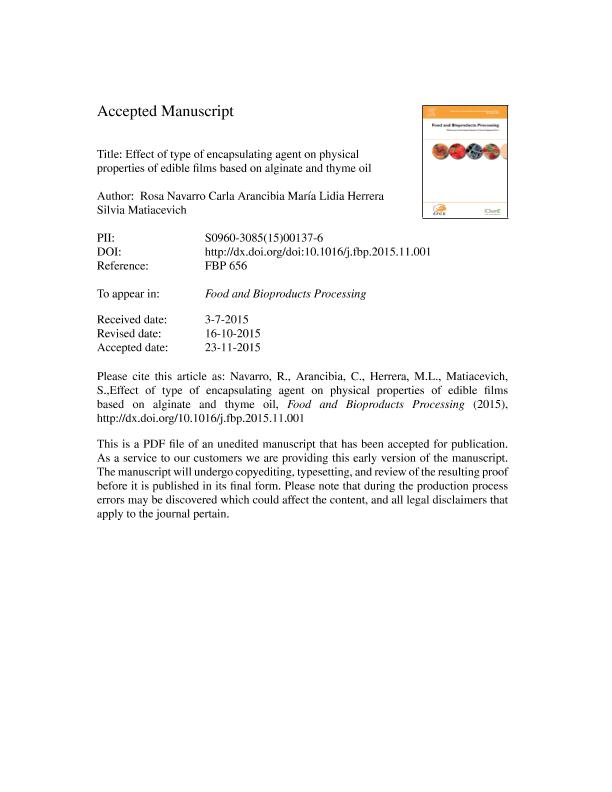Mostrar el registro sencillo del ítem
dc.contributor.author
Navarro, Rosa
dc.contributor.author
Arancibia, Carla
dc.contributor.author
Herrera, Maria Lidia

dc.contributor.author
Matiacevich, Silvia Beatriz

dc.date.available
2018-03-14T20:12:34Z
dc.date.issued
2016-01
dc.identifier.citation
Navarro, Rosa; Arancibia, Carla; Herrera, Maria Lidia; Matiacevich, Silvia Beatriz; Effect of type of encapsulating agent on physical properties of edible films based on alginate and thyme oil; Institution of Chemical Engineers; Food and Bioproducts Processing; 97; 1-2016; 63-75
dc.identifier.issn
0960-3085
dc.identifier.uri
http://hdl.handle.net/11336/38794
dc.description.abstract
Active edible coatings incorporating antimicrobial agents such as thyme oil are studied to improve the shelf-life of fresh foods. The type of encapsulating agents used to microencapsulate the active compound could affect both, emulsions and film's physical properties. The aim was to study the effect of different encapsulating agents (trehalose, β-cyclodextrin and Tween 20) on physical and antimicrobial properties of alginate/thyme oil emulsions and films. Physical and antimicrobial characterization of film-forming emulsion and films were developed. Results showed differences in rheological behavior, particle size and stability of emulsions by encapsulating type. The highest stability of emulsions containing Tween 20 (instability of 0.69%) was attributed to more interactions between components (observed by FTIR) and the lowest particle size, but other samples also showed high stability (instability <5%). The stability of emulsions did not correlate with films microstructure indicating that interactions amount components changed when solvent was evaporated. Films containing trehalose and β-cyclodextrin had less color and opacity than Tween 20, which is an advantage by industrial applications by coating due cannot affect the organoleptic characteristics of a fresh product. In conclusion, it is important the choice of encapsulating agent in order to use for developing active coatings with potential for applications in fresh food.
dc.format
application/pdf
dc.language.iso
eng
dc.publisher
Institution of Chemical Engineers

dc.rights
info:eu-repo/semantics/openAccess
dc.rights.uri
https://creativecommons.org/licenses/by-nc-nd/2.5/ar/
dc.subject
Alginate
dc.subject
Emulsions
dc.subject
Encapsulating Agents
dc.subject
Films
dc.subject
Physical Properties
dc.subject
Thyme Oil
dc.subject.classification
Alimentos y Bebidas

dc.subject.classification
Otras Ingenierías y Tecnologías

dc.subject.classification
INGENIERÍAS Y TECNOLOGÍAS

dc.title
Effect of type of encapsulating agent on physical properties of edible films based on alginate and thyme oil
dc.type
info:eu-repo/semantics/article
dc.type
info:ar-repo/semantics/artículo
dc.type
info:eu-repo/semantics/publishedVersion
dc.date.updated
2018-03-14T17:14:21Z
dc.journal.volume
97
dc.journal.pagination
63-75
dc.journal.pais
Reino Unido

dc.description.fil
Fil: Navarro, Rosa. Universidad de Santiago de Chile; Chile
dc.description.fil
Fil: Arancibia, Carla. Universidad de Santiago de Chile; Chile
dc.description.fil
Fil: Herrera, Maria Lidia. Consejo Nacional de Investigaciones Científicas y Técnicas. Oficina de Coordinación Administrativa Houssay. Instituto de Tecnología En Polimeros y Nanotecnología. Universidad de Buenos Aires. Facultad de Ingeniería. Instituto de Tecnología En Polimeros y Nanotecnología; Argentina
dc.description.fil
Fil: Matiacevich, Silvia Beatriz. Universidad de Santiago de Chile; Chile. Consejo Nacional de Investigaciones Científicas y Técnicas; Argentina
dc.journal.title
Food and Bioproducts Processing

dc.relation.alternativeid
info:eu-repo/semantics/altIdentifier/doi/http://dx.doi.org/10.1016/j.fbp.2015.11.001
dc.relation.alternativeid
info:eu-repo/semantics/altIdentifier/url/https://www.sciencedirect.com/science/article/pii/S0960308515001376
Archivos asociados
